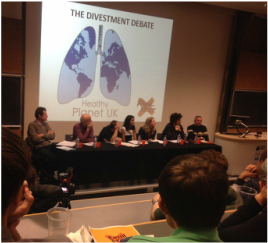|
This post was written by Tahmina Parveen of UEA Healthy Planet following their university debate on fossil fuel divestment, organised by the Healthy Planet Branch last month. Find out more about UEA Healthy Planet and get involved at their Facebook and Twitter pages. UEA Healthy Planet hosted a debate putting forward arguments from six panelists from different backgrounds, proposing answers to the question: ‘Should UEA cut ties with the fossil fuel industry’ on the 22nd October. The rationale behind this debate is because UEA is well known for its research in climate change, however this institution has over £130,000 invested in fossil fuel companies, including Shell and BG group. Dr. David Pencheon, the Director of the NHS Sustainable Development Unit, proposes that unless health systems and universities show big symbolic signs that something is ethically, health-wise and financially undesirable, we will be perpetuating it. Chris Jarvis, UEA Student Union’s Campaigns and Democracy Officer, reiterates Dr Pencheon’s perspective, claiming that divestment represents a more profound and symbolic change. He outlines that it is hypocritical for an institution that wants to continue its reputation as progressive, to exacerbate the worst aspects of climate change by investing in the fossil fuel industry. Emma Silk, UEA Environmental Sciences graduate and former Fossil Free campaigner, emphasised a point of hypocrisy. As an institution that is one of the leaders in climate change and environmental sciences research, how can UEA fund the industry that is doing the most damage? Furthermore, UEA has justified its inaction by stating that their investment are made into “sustainable and ethically appropriate funds,” however, these companies are notorious for their disregard of human rights and environmental abuse. Brett Scott, a financial activist questions the “risk and return” ideology of traditional finance. He argues that high returns do not justify the “undermining of ecological stability and humankind.” Historically, protests have been shown to be effective in forcing the industries to change, it is a resource that we must exploit in order to build a progressive society. UEA economics lecturer, Dr Fabio Arico pushed his pro-divestment view in which he stated that the most important role of this institution is to improve education and innovation. He believes that the university is unable to afford the cost of divestment and that students and UEA as a whole would be better off looking at a different take on being environmentally friendly.
The event was closed by a few more statements from each member of the panel. Jarvis’ statement struck a resounding chord among the audience as he concluded by saying that “money being invested in the fossil fuel industry is your [students’] money you pay into the university in your tuition fees. Together, we can make sure this issue won’t go away.” To continue our support of action for climate change, we are looking forward to the People’s March in London and the COP21 in Paris in the upcoming weeks
0 Comments
Your comment will be posted after it is approved.
Leave a Reply. |
Details
Archives
February 2019
Tags
All
|

 RSS Feed
RSS Feed
